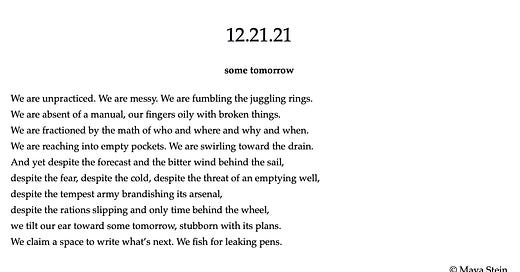
In high school and college, I took great pride in my rhyming skills. (Actually, it started in 4th grade, when I won a school-wide contest for coming up with the most words rhyming with “bat.”) I have a not-insignificant body of work from those years in which I practiced impressing myself with rhyming lines, and gleefully reading these offerings to others. At the time, it felt like the pinnacle of poetry lay in the act of contorting the lines in meter and rhyme, like stuffing them into corsets. I enjoyed the hyper-satisfactory sensation of following the established forms of sonnets (in particular), connecting me as they did to a larger literary canon. In short, writing in form and rhyme and meter gave me a sense of belonging.
But implicit in the act of joining a group is the potential loss of individual identity. In terms of poetry, it meant focusing less on personal subject matter than on linguistic acrobatics. I wouldn’t have necessarily known or been able to articulate this at the time - I was too busy sharpening my figurative knives on the chopping block of conformity.
Eventually, I tiptoed away from form and discovered the playground of free verse. And have generally stayed there, save for occasional returns, largely for the sake of my own entertainment. (I remember a conversation with my grandfather once, where he praised me for my rhyming poems but said that my other, non-rhyming work didn’t really qualify as poetry.)
In any case, this poem dips its toes in that old sandbox. Here, I gave myself the challenge of writing a “serious” poem using a rhyming pattern (the ends of the lines here would be considered “slant rhymes” because they don’t quite map congruently, i.e. “when” and “drain,” “sail” and “well,” etc.). I loved the process of applying this construct to the writing and maneuvering through it as authentically as I could (meaning, being “real” instead of trying to be “clever”). With this poem, and the themes it touches on - things beyond our control, in particular (the absence of a manual, the forecast, the tempest army…all metaphors for the current Covid crisis, among other things) - having a kind of template to write inside offered both a counterpoint to the uncertainties and vagueness of the future (“some tomorrow”) and a way into the final couplet of the poem, where stubborn plans and leaking pens may be among the few tools we have left to write our way forward.
And here, I want to take a moment to thank you for your companionship, readership and support in this Substack endeavor. I am grateful for the opportunity to dive into this practice and share in the discoveries with you. I look forward to seeing what will reveal itself in 2022!



